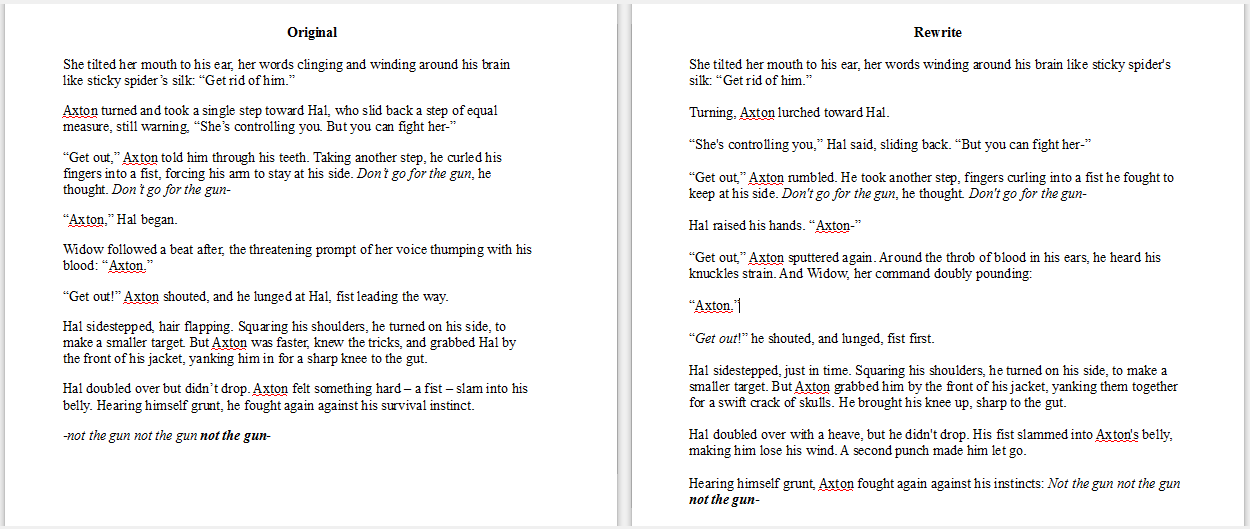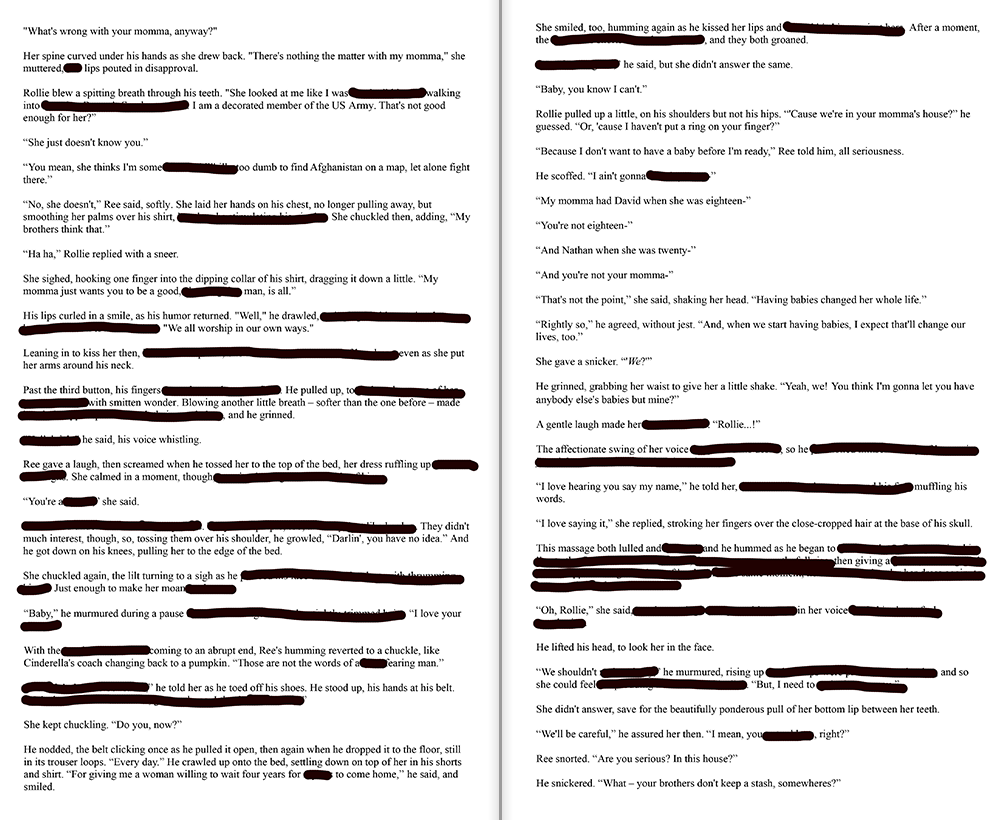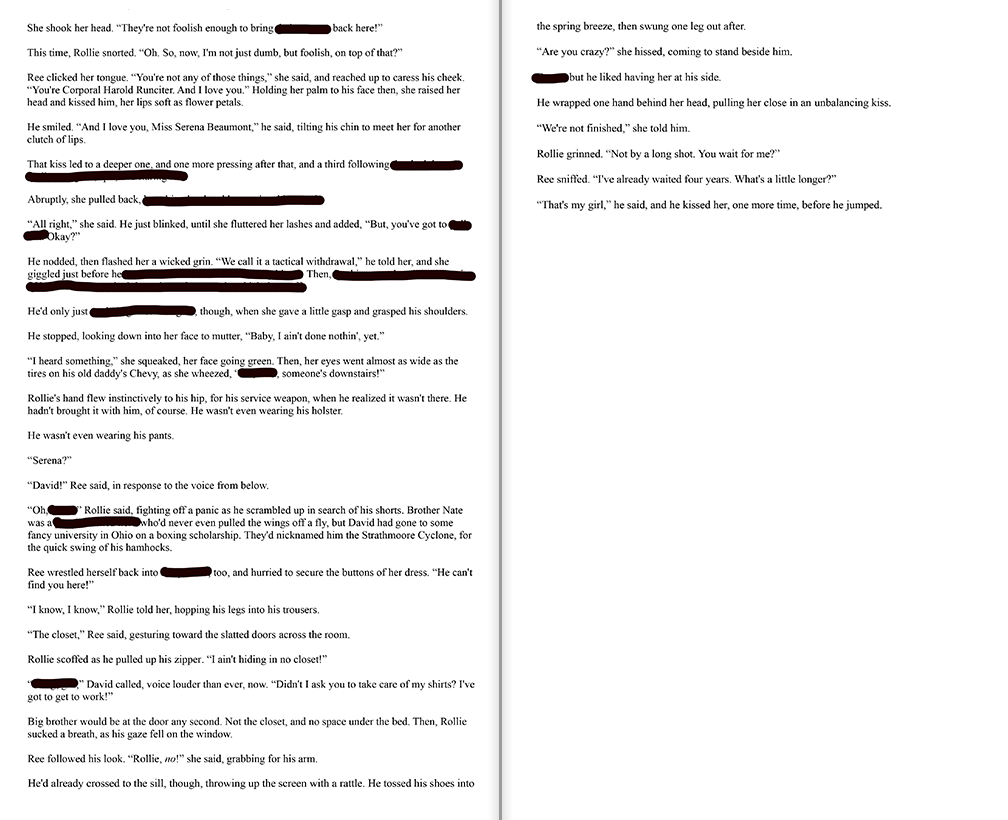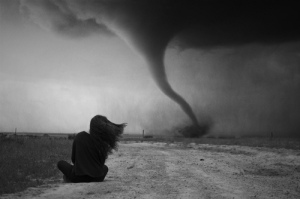by Mayumi-H | Oct 19, 2013 | From Hell (A Love Story), Process
A few weeks ago, I put up on the blog an excerpt of a fight scene I was having trouble with. Based on your feedback, I made some changes to the text, ones I hope create a smoother experience for the reader. Do they or don’t they? I’ll let you be the judge. (Clicking the image below will let you read both the original and updated versions, the latter of which I posted for readers just this past week, coincidentally enough.)

I like to think the update works better within the confines of the chapter…but I’m never sure. Because working from feedback has always been difficult, for me.
I like getting critique, especially if it can help my story become better: tighter, clearer, more effective. But, I spent a large part of my early writing life aping others. My sister first, then my favorite published authors. To this day, when I read books while I’m in the middle of writing a story, I find myself incorporating others’ techniques and quirks. It’s been said imitation is the sincerest form of flattery. Though, when does imitation go too far, and we lose our own voice to the art?
I like my voice. It varies from story to story (admittedly, less successfully when I drag out a story for too long), but I like thinking of my stories as my own. When I get critiqued – especially when it’s good critique – I always hesitate. “If I change this phrase to x, will I sound more like A? If I edit that section to y, is my voice becoming like B?”
Even though I may not be destined for publishing, I still want my story to be the best it can be. So, in some cases, writing like favorite author A or insightful reader B might be better. But, does that make a story less mine, less me? I don’t know.
In the face of solid critique, how do you remember to keep to your own voice?
by Mayumi-H | May 22, 2013 | Persona 4 Fan Fiction, Process, Short Stories
A few weeks ago, I wrote about a particular Free Write Friday picture prompt (Free Write Fridays from Kellie Elmore). What came from that free write session was about 1600 words of a relationship story, one that flowed so naturally from my fingers, I just couldn’t stop writing it. As I mentioned in that earlier post, what struck me as I wrote those characters was how much of a role their religion played in their dialogue. Their sexuality also featured prominently, which is one of the main reasons why I didn’t post the piece at the time. Because you never know who you might offend.
Generally speaking, offending potential readers is not something I care very much about. It’s my belief an artist should create Art that speaks from the soul, no matter how dark, bright, raunchy, or chaste. Whether the artist can then sell that creation if they so choose is an entirely different debate. But, the Art at its core should be honest. Otherwise, it’s not so much art or even craft, but simply a consumable.
Side note: I’m not saying there’s anything inherently wrong with producing for consumption. Nor am I saying consumables necessarily exclude artistry, or vice versa. I think A Song of Ice and Fire has proven that pretty well. Besides, every one needs to eat, no matter how high-falutin’ their principles.
That said, I recently revisited that piece of free writing because I was curious to look at it with fresh eyes. I wanted to see if it really was as bad as I’d originally thought. Holding a marker, I went over and redacted everything I thought anyone could possibly find offensive in any way. This is what came of that exercise:


If, for some reason, you’re interested in the actual words, click the images for a more legible experience (they’ll open in a new window or tab). The scene itself isn’t important, though. The reason for this exercise – aside from fueling my own personal amusement – was for me to see just how much black there’d be on those pages.
I’m not particularly smart, so I can’t write good mysteries or thrillers. I’ve only ever held a gun once, and never in a conflict, so I’m not qualified to write a big war epic. But, I understand people, and the everyday conflicts that can arise from personality and heritage clashes. I know love, too, because I experience it in my life every day. And I like sex, because…well, who doesn’t?
I don’t pull many punches when it comes to my stories. I try my best to warn folks ahead of time if a story contains questionable or mature material, but I also believe any individual should be able to decide for themselves if they want to continue or not. But, I’m writing these for me, first, and those topics are the ones I personally enjoy exploring. If they need to be redacted later, to fit someone else’s idea of what’s appropriate or salable, well, that’s life.
Have you ever redacted or edited something you’d written to fit someone else’s sensitivities? Why did you do it? Or, if you didn’t do it, why not?
by Mayumi-H | Apr 17, 2013 | Persona 4 Fan Fiction, Process
Last Friday’s Free Write Friday prompt from Kellie Elmore was the below photo:
What struck me about the photo was not so much the twister itself or the girl in the foreground, but the way people’s lives can often feel like they’re caught in a storm. And, how lonely that girl’s silhouette is. From nowhere – truly, nowhere, as I am, at the moment, working on three very different stories with nothing to do with the prompt – a scene popped into my head, bright as a bolt of lightning: a young man and young woman hiding together, to be together. It was very conversational but still mostly descriptive of their clandestine affair, which is why I chose not to submit it to the prompt.
The odd part about this story snippet was not the flash of inspiring imagery, or the way these characters felt like familiar ones to me, or even the main conflict fashioned by my brain for why the two of them should meet in secret. Rather, it was the smaller conflict of their histories. Specifically, how religion related to their interaction.
If you think violence or sex are hot-button issues, they’re nothing compared to religion. I don’t even feel very comfortable talking about it, here, because… I don’t know. Because I’m scared, I guess.
Not many readers take issue with crime or violence in stories. It’s part of real life, after all. Sex is a slightly touchier subject, probably because it’s associated with prurience or deviance (which is not always the case, but I think I’ve belabored that point already). Faith, though, is unique to each individual person. Nonetheless, it often feels like we’re treated only to religious extremes, in fiction: fanatics like Margaret White (the mom in Stephen King’s Carrie) or the Republic of Gilead in Margaret Atwood’s The Handmaid’s Tale. Given such examples, it’s hardly a wonder that religion often does not play a role in many stories, at least, not a prominent one.
So, why did I take a religious angle for that scene? Mostly, it came from the dialogue. Evidence of their faith sprang, fully formed, from these characters’ mouths. They didn’t preach to me or to each other. They simply were who they were: a mid-western society girl and her working-class, ex-Army boyfriend. Not even their different racial backgrounds featured so prominently in their characterizations as their religious upbringing.
It was weird. Because my own faith is very personal, and I’d never inject those feelings into a story. Not consciously, any way. Sure, religion has had its part. I’ve examined Shinto, but only for the burial rituals and a wedding ceremony; two of my earlier protagonists were Catholic versus Protestant just for a few low-level jabs; I’ve looked at Anglicanism in a broader sense from a social perspective, mostly to counterbalance the dourness of one of my scientific empiricists. But having characters mouth off to each other about church and faith? That was new.

Shrine to World Religions, by Helen (Flickr: Shrine To World Religions) [CC-BY-2.0], via Wikimedia Commons
Have you ever had your characters take you by surprise, about their personal agendas or perspectives?
by Mayumi-H | Apr 6, 2013 | Fearless, Short Stories
This week, Lillie McFerrin’s prompt for her Five Sentence Fiction challenge is “WORDS.”
I went a few different ways with this prompt, at first…though, my initial flash fiction idea – while based on a true story – pushed the vulgarity a bit too much than I like to do for a public challenge. So, this little vignette, taken from the early days of Fearless:

By AstroHurricane001 at en.wikipedia [Public domain], via Wikimedia Commons
“The loss of artful conversation”
Stretched upon the sand, beneath a canopy of stars, with the rhythm of the rolling current nearby, the lads often turned reflective.
“I think,” Neville mused softly, “with all this technology, and the culture of instant messaging, mankind’s lost the skill of artful conversation, like the poetry that used to exist in the days of Shakespeare, or Milton: what happened to that, where’s all that gone?”
With his head laid in the pillow of Amber’s lap and soothed by both the sound of waves and the gentle drift of her fingers through his hair, Ross hummed, and murmured, “There might be something to that. But,” he added, his gaze finding Amber’s as he opened his eyes again, “for some things, I don’t think you need conversation.”
That settled the lads for a long minute, until Niall sniffed, and declared:
“I’m gonna bring back ‘rad.’”
I’ve spoken on this blog about making art with words before, so I don’t think it needs repeating. I do often wonder, as Neville does, if the immediacy of communication hasn’t taken away some power of words, though. When was the last time we made efforts to write real letters, rather than emails, or instant messages on a phone?
Or, perhaps, I’m just waxing nostalgic, and that old power of lyricism in dialogue has been replaced by something else. What do you think? How do WORDS speak to you?
by Mayumi-H | Mar 6, 2013 | Process

Writers’ Museum in Edinburgh. In Lady Stair’s House. Photo by Jeremy Keith.
Now, I’ve shared my stories with others before: friends, writing buddies, family (once in a while), even strangers. I don’t stress about feedback from any of those folks. They receive my stories as a chunk of text to absorb, and, for the most part, their feedback is a simple, “I liked it,” or “I didn’t.” We may go into slightly more detail than that, but it’s often conversational, with comments painted in pretty broad strokes.
A professional edit, though, picks a story apart scene by scene, line by line, word by word. That’s good. It helps a writer step outside the confines of their little self-imposed world, to have someone examine that world with a sharp, precise knife and cut where necessary. They may do a little triage, too, to keep the story pumping. I’d trust an editor – especially a good one, like I was lucky enough to get – to do that.
When I received the pages back and finished reading through all the comments, I wanted to scuttle back into my NaNo hole and tear the whole story apart again. Not because I was crushed or demoralized by those red marks. Because those red marks showed me there was something there. And I wanted to fight for it. I wanted to dig deeper into myself and that world and those characters, and make the story better. Because, with those fixes and suggestions, I knew it could be so.
I didn’t think I’d pick up that story again. It was a first draft, and first drafts always need work. But, when I crossed the NaNo finish line last year, I thought, Good enough. Now, I know how wrong I was. The best bit? The editor never came out and told me I could do better. It was everything between the lines: all the little ticks and tacks that – when I saw them – I knew were right.
In hindsight, I shouldn’t have worried. The editor’s feedback was great. Not to say it was all glowing praise, because it wasn’t that. Rather, it was observant, critical, and helpful, what a proper edit should be. And, just reading through the comments for that one scene made me realize the story wasn’t all it could be.
I wasn’t all I could be.
So, I decided to take the pages back and start over. Not from scratch, because I do like a lot of the story already. But the suggestions and observations are with me every time I start to play in that world again. And when I play in all my other worlds, too.
The story may never be great, or a bestseller, or even publishable. But I can make it better than it was before.
Better. Stronger. Faster. Dah-na-na-naa! Dah-na-na-na-na Na-na-na-naa!
[youtube http://www.youtube.com/watch?v=HofoK_QQxGc?rel=0]
What words of wisdom do you have for a hopeful aspirant? Got stories of your own to share? Want to trade? Let me know!








Recent Comments
The Real Person!
Author Mayumi-H acts as a real person and passed all tests against spambots. Anti-Spam by CleanTalk.
The Real Person!
Author Mayumi-H acts as a real person and passed all tests against spambots. Anti-Spam by CleanTalk.